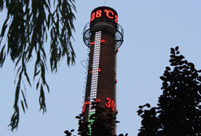 Amphibious armored vehicle unit conducts open sea drill
Amphibious armored vehicle unit conducts open sea drill
 Water relay in Henan
Water relay in Henan
 Ethnic culture feasts eyes of travelers
Ethnic culture feasts eyes of travelers
 80 security dogs assembled in Nanjing police dog training base
80 security dogs assembled in Nanjing police dog training base
 Graffiti artists paint on street walls in Xinjiang
Graffiti artists paint on street walls in Xinjiang
 Story of ceramic artist Zhang Lingyun
Story of ceramic artist Zhang Lingyun
 Magic summer night dream in Hongyuan
Magic summer night dream in Hongyuan
 Incredible creatures in headwaters drainage region of Lancang River
Incredible creatures in headwaters drainage region of Lancang River
 The future of rock n' roll seen in young rockers in China
The future of rock n' roll seen in young rockers in China
 Magnificent Yanziya Cliff
Magnificent Yanziya Cliff
NICOSIA, Aug. 14 -- Archaeologists digging an ancient Hellenistic city in Cyprus have come upon a family tragedy 24 centuries ago, the Cypriot Department of Antiquities announced on Thursday.
It said the archaeologists who continued excavating at the ancient city-state of Kourion have come upon the remains of four members of a family believed to have been buried under the ruins of their house which collapsed following a massive earthquake that destroyed the city in the fourth century BC.
"Initial analysis indicates the remains consist of two adults, a juvenile, and an infant. The family was found huddled together trying to protect one another; the infant was found under the right arm of one of the adults," said the statement.
It seems they did what most people would do today in case of a quake. They took cover in a corner outside a doorway but this did not help much. They were killed by the collapse of large stone walls, their bones badly crushed and, in some instances, found directly under collapsed architectural stones.
The site of the family tragedy was inside what may have been an elite house as assessed on the basis of the costly material culture, the monumentality of the architecture, and the expensive decorative materials such as gypsum flooring and marble facing that once adorned the architecture.
It was potentially two stories high and rich in material remains, including a large glass plate similar to plates which were made in Egypt and are usually found in Coptic cemeteries.
A large marble vase, numerous additional highly decorated glass fragments, and fine ceramics indicate the wealth of the household and help accurately pinpoint the date of the tragedy to be mid-fourth century BC.
This date has been supported by the numismatic analysis of the coins from the building by numismatist Dr. Paul Keen of the University of Massachusetts (Lowell).
The excavation was carried out under the direction of Dr. Thomas W. Davis of the Tandy Institute for Archaeology at Southwestern Baptist Theological Seminary in Fort Worth Texas, the United States.
Kourion, a wealthy city on the shores of south Cyprus perched high on cliffs above the eastern Mediterranean sea was rebuilt after the quake and developed into an important Roman city, boasting one of the finest Greco-Roman theaters, rich mosaics and roman baths noted for their intricate plumber.
The city was again demolished in a massive earthquake in 15 BC listed by the Cyprus Geological Department as one of the greatest tremors to hit the quake prone island.
The same tremor also demolished the city of Paphos, famed all over the ancient world of the eastern Mediterranean for its love ceremonies in honor of Aphrodite-Venus, the Cypriot-born goddess of love.
 Beijing policewomen posters become a hit
Beijing policewomen posters become a hit Armored regiment trains on the sea
Armored regiment trains on the sea Children spend 'Father's Day' with dads at work
Children spend 'Father's Day' with dads at work 'Pan Da' appear in Shanghai World Financial Center
'Pan Da' appear in Shanghai World Financial Center Champions take selfies on podium
Champions take selfies on podium National Fitness Day celebrated around China
National Fitness Day celebrated around China Traditional culture colors summer vacation
Traditional culture colors summer vacation Young athletes fighting for their dreams
Young athletes fighting for their dreams 68 meters high thermometer in Shanxi, called ‘fighter’ of thermometers
68 meters high thermometer in Shanxi, called ‘fighter’ of thermometers The vanishing folk skills
The vanishing folk skills Intoxicating beauty of Dali, Yunnan province
Intoxicating beauty of Dali, Yunnan province Memorable moments of Ludian earthquake
Memorable moments of Ludian earthquake Bring world together to help elephant
Bring world together to help elephant 'Building Dreams'
'Building Dreams'  Labrang Monastery
Labrang MonasteryDay|Week|Month